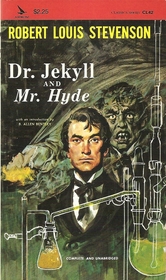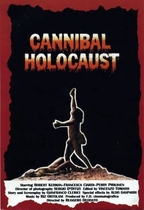Our editor-in-chief Nate Yapp is proud to have contributed to the new book Hidden Horror: A Celebration of 101 Underrated and Overlooked Fright Flicks, edited by Aaron Christensen. Another contributors include Anthony Timpone, B.J. Colangelo, Dave Alexander, Classic-Horror.com's own Robert C. Ring and John W. Bowen. Pick up a copy today from Amazon.com!
Cold Reads: The Strange Case of Dr. Jekyll and Mr. Hyde by Robert Louis Stevenson
Deep in the impenetrable mist, a beast cries out in the night, a cry that is longing for release and raging to quench a thirst that can only be satiated in the misery of others. This is the scene taking place both in the streets of London and in the tortured soul of Henry Jekyll in Robert Louis Stevenson's horror classic. Within a mere 87 pages, Stevenson takes us on a journey that we are likely never to forget, even after years of reading his beautiful words.
Along with the other novels discussed in this month, the plot of The Strange Case of Dr. Jekyll and Mr. Hyde has been ingrained in the minds of the world at large to a point that most can recite the general premise without a second thought. Henry Jekyll, a good physician with a heart of gold and a stirring motivation to unveil the shroud of the human psyche, concocts a mysterious draught that, when imbibed, brings forth a physical manifestation of Jekyll's darker side in the persona of the despicable Mr. Edward Hyde.
It may come as a surprise to the average reader that we are only introduced to this common story in the very last chapters of the novella. The story is presented as a mystery of sorts, but it almost seems condescending to label it as a "detective book" by any definition of the term. Rather, Stevenson's tale is seen through the eyes of those close to Jekyll, namely his stuffy lawyer friend Utterson, as he penetrates through the strange happenings and circumstances like any real human would. He is first introduced to Hyde's character through a friend named Enfield who relates to the lawyer a disturbing encounter he had when Hyde trampled over a screaming child in the streets without turning a single hair on his ape-like knuckles. When Utterson discovers that this creature is connected to Jekyll, he desperately tries to aid his companion in ridding himself of Hyde's evil shadow. Utterson is a completely normal person; he has no love for mysteries or any desire to engage in adventure. He simply wants to help his friend and tries to go about it in the most conservative way possible.
To counter Utterson's humanity, Stevenson shows us the inhumanity of Edward Hyde through brief but effective scenes. Stevenson cleverly skates around describing Hyde with too many physical details; instead, he tells us the effect that his very presence has on all those who come into contact with him. Stevenson constantly refers to some "hidden deformity" that Hyde possesses, some subtextual, lingering depravity that lurks just beneath his skin and strikes some primal chord in the other characters' hearts, exhibited in their repulsion and apprehension of him. This is a truly effective method that Stevenson utilizes; every time Hyde merely speaks or smiles cruelly at his deeds is guaranteed to send shivers up the reader's back.
An additional misconception that others will most likely have is that Jekyll and Hyde are simply Good and Evil personified and have an epic inner battle that Frank Wildhorn would be proud of. Fortunately in the novella, this matter is not as cut-and-dry and juvenile. Though Jekyll may be a proud member of society (healing the sick, giving to charities, the whole heroic bit), he is anything but a Victorian version of a squeaky clean, boy scout Superman. He is plagued by a compulsive shame in finding pleasure in the less-finer things in life. It is this that motivates him to search for a way to separate the degenerate caveman in us all so that the inner, upstanding do-gooder can go their merry way. While the furthering of medicine and psychology do take a part in his toils, one can't help but feel that self-interest and salvation are the main factors in the kindly doctor's pursuits.
Even after Jekyll successfully transforms into Hyde and dives head-first into the "sea of liberty", it seems like he's having too much fun to take notice of the morality of his actions. After brutally killing a respectable gentleman in the streets and leaving him to rot while in the guise of Hyde, Jekyll swears off the chemical for good. But like any other addicting drug and the sweet promises that come with them, Jekyll is called back time and again to take the potion and awaken the monster inside of him. It raises the question for debate: "Does Jekyll even want to return to his former self?" Whatever the answer may be, this point shows us that Stevenson depicts Jekyll as a real flesh and blood character who is given to downfalls and conflicts rather than a cookie cut from the Good Guy Dough.
Hyde is more than just a cackling comic book villain as well. While he may be quite depraved and given to a homicide here and there, Hyde isn't an all-knowing, nefarious bad guy who's always one step ahead of the heroes. He's more of the weaselly, scummy jerk that you would see hanging out in the dark corner of the local brothel. He panics when he is faced with possible arrest and execution and scatters about like a filthy rat that's been found munching on a hunk of cheese in the refrigerator. And when the novel reaches its climax, Hyde appears to win when Jekyll turns into his dark persona for the final time. Alas, Hyde (or perhaps Jekyll) makes their last decision to be one of self-destruction. It is not made clear which "side" might have planned to perform the deed; the point of the matter is that there never were truly two "personalities" at all but just different variations of one man.
Another fascinating feature of the novel is the depiction of the characters and the world they live in. Gone are the tall, brooding castles of Gothic Europe and the adventurous heroes and damsels who are given to romantic fancies. Stevenson brings us to the very heart of London, the complete opposite of the fantastic landscapes of his predecessors. He shows us that the true horror, in addition to lurking within the darkest corners of our very hearts, can also be found in the most urban and modern city in the world. Stevenson brings the boogeyman home, up close and personal; there's no running away from him now. The characters themselves, especially Utterson as mentioned before, do not exaggerate or go into Lovecraftian detail on the terrors that they encounter. They react as men of their status and age would given the strange goings-on. Utterson isn't an expert on monster killing or the mad engineer of grotesqueries: he's a middle-aged lawyer who is wrapped up in a perplexing mystery that he simply tries to get a firm handle on. All these elements add a deep realism to the tale, revolutionizing the way in which horror would be depicted for years and years to come.
The true beauty of the book, though, lies in Stevenson's economic style of writing. In my honest opinion, he is a great practitioner of the art of saying what is only necessary. And what he does say will linger in the reader's mind long after they've closed the book and placed it back on the shelf. Only a truly great writer can wield the power to register such sensations in their audience with a few choice but profound words. Poetic phrases such as "black winter morning" and the aforementioned description of Hyde's damning aura will be recalled again and again to the pleasure of those who are lucky enough to read this phenomenal piece of literature. It is rightly so called a "horror classic" as it helped define an entire sub-genre concerning the evil within us all, exemplified by stories concerning werewolves and psycho killers lurking in our midst.
But, as said before, to call The Strange Case of Dr. Jekyll and Mr. Hyde anything but "amazing" seems to demote it to some lesser value. This book should be viewed by any fan of any genre of literature and even those who aren't big on reading. It is best read while on a foggy night or rainy afternoon in front of a roaring fire, savoring each word and turn of the page as one would with a fine, rich wine.









I absolutely LOVE this series
I absolutely LOVE this series of articles. Reading is something that a lot of people don't think of in conjunction with horror unless Stephen King's the author. I've been spreading the word about these articles, and I hope that it is encouraging people to read these important novels for the first time, or again. Thanks for your insightful, informative pieces, Jose. I can't wait to read the next one.
Chris Gaskey
http://chrisgaskey.tumblr.com
http://www.skyemag.com
http://www.facebook.com/chrisgaskey
http://www.twitter.com/chrisgaskey
After being raised on the
After being raised on the countless movie and TV versions that have been produced over the past century, I found the original story to be quiet different. As you mentioned, the book is a mystery based on Utterson’s view point, letting the reader assume that Jekyll and Hyde are two totally different persons. On the other hand, the movie versions, possibly based on early stage play adaptations of the novella, are told from Dr. Jekyll’s point of view and approach the story as a “man turns into monster” tale, injecting romantic elements not present in Stevenson’s original story. Personally, I found the story told as a mystery to be very interesting, even though I knew what the outcome would be. (Unfortunately, the only readers who would find this story to be a mystery today are those who have never heard of Dr. Jekyll and Mr. Hyde.)
Paul
Chris- Wow. I'm truly
Chris- Wow. I'm truly flattered, sir. I'm glad that you've been enjoying these articles as much as I enjoy writing them. Horror literature is a fascinating art form and I hope that I can inspire people to seek some of these pieces out. I hope my future additions will continue to please.
Paul- You're spot on about the Jekyll adaptations. It really is interesting to read the book after having all these concepts that have practically been embedded in the social consciousness over the years. The romantic elements you spoke of add a more linear narrative to the story and a good ol' heaping of melodrama to heighten the thrills. As great as some adaptations may be, give me Stevenson's novel any day of the week.
Jose Cruz
No sweat, Jose. I definitely
No sweat, Jose. I definitely hold the same high hopes that you do about your articles.
Speaking of film adaptations, I would love to see someone tackle this as a straight-up retelling of the novel. I think, done correctly, the audience can buy that Jekyll and Hyde could possibly be two people even though everyone already knows better. It's like any film in a series: you know, say, Kirk's crew is going to win, or Superman will save the day, but it's the journey of getting there that matters.
Chris Gaskey
http://chrisgaskey.tumblr.com
http://www.skyemag.com
http://www.facebook.com/chrisgaskey
http://www.twitter.com/chrisgaskey